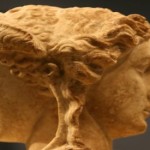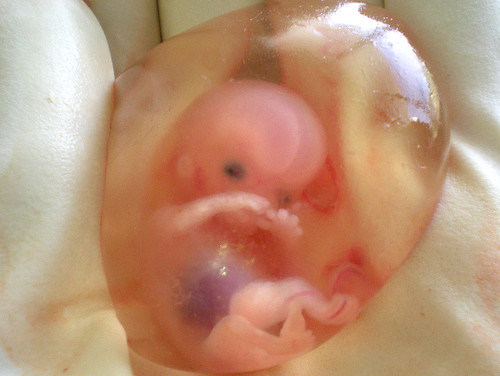We run our website the way we wished the whole internet worked: we provide high quality original content with no ads. We are funded solely by your direct support. Please consider supporting this project.
Did Jesus Have Two Minds?
As I laid out in the previous post, I believe Jesus is fully God and fully human. The question is: How is this possible? How do we talk about the way that Jesus was fully God and fully man?
The Creed of Chalcedon (451) tries to answer the question this way:
We, then, following the holy Fathers, all with one consent, teach men to confess one and the same Son, our Lord Jesus Christ, … truly God and truly man, … to be acknowledged in two natures, inconfusedly, unchangeably, indivisibly, inseparably; the distinction of natures being by no means taken away by the union, but rather the property of each nature being preserved, and concurring in one Person and one Subsistence, not parted or divided into two persons…
While the Creed defends against basic Christological heresies of the early Church, it actually does not answer our question. It just sets the boundaries that must be observed to avoid heresy. We must still make sense of the incarnation within these boundaries.
The way most theologians in the church tradition have done this, at least as it concerns the question of Jesus’ knowledge, is often called a “two minds Christology.” This view holds that Jesus walked the earth with both the all-knowing mind of God and the limited knowledge of a human being. And one could argue that the Bible supports this claim. Jesus occasionally demonstrated an omniscient awareness of people’s innermost thoughts and motives (Jn 2:24-25; Mt 9:4). He expressed a divine knowledge of Judas’ deceitful heart and future betrayal (Jn 13:18-19, 21-27), of Peter’s future denial (Lk 22L31-34) and the exact mode of his death (Jn 21:18-19), of a stranger who would open up his house to him and his disciples (Mk 14:12-16), and of a coin that would be found in a fish’s mouth (Mt 17:24-27). At the same time, as a full human being, Jesus often indicates that his knowledge was limited. So, this tradition concludes, Jesus somehow simultaneously possessed “two minds”: a divine omniscient mind and a human finite mind.
This view is not without its problems. To be honest, I have always had trouble rendering this view coherent. It requires us to imagine that Jesus was aware of what was happening with every molecule on every planet in the universe even while he was a zygote in the womb of Mary. And it requires that we imagine this while also affirming that, as a fully human zygote, Jesus was completely devoid of any awareness. Is this a legitimate paradox or an unacceptable contradiction? One could easily argue the latter. If being God means that one is omniscient and that being human means that one is not omniscient, then it seems we are asserting A and not A in claiming Jesus was both. We could argue along the same lines regarding God’s omnipresence and omnipotence. And if this is true, then in asserting that Jesus was a single person who was fully God (and thus fully omniscient) and full human (and thus not fully omniscient), we are asserting nothing, just as when we say “married bachelor” or “round triangle.”
There is an alternative way of talking about how Jesus was fully God and fully human, however. It has been labeled the “kenotic Christology,” based on the word kenosis, which is Greek for “to empty.” More specifically, it is based on Philippians 2:7. In my next post, I’ll begin with a discussion of this passage.
If you want to read a basic introduction to the Classical view of the Incarnation, I recommend G. Boyd, P. Eddy, Across the Spectrum, (Grand Rapids, MI: Baker Academic, 2009), 111.
Category: Essays
Tags: Essay, God, Incarnation, Jesus, Kenosis, Omniscience, The Mind
Topics: Christology
Related Reading

God is Not What You Expect
Jesus came, in part, to finally reveal the absolute truth about God. He is the way and the truth (alethia) and the life (Jn 14:6). The word “truth” means “uncovered.” And what we find once God is uncovered is that he’s completely different than what we fallen humans generally expect God to be. As we…

Caught Between Two Conflicting Truths
In my previous blog I tried to show that adopting a “Christocentric” approach to Scripture isn’t adequate, as evidenced by the fact that people adopting this approach often come to radically different conclusions. In fact, it seems to me that the “Christocentric” label is often close to meaningless inasmuch as it doesn’t meaningfully contrast with anything. If a “Christocentric”…

What are the different models of the Trinity in the Christian tradition?
The Psychological and Social Models of the Trinity The Bible teaches that there is only one God. At the same time, it teaches that the Father, Son, and Holy Spirit are each fully God. For this reason the church has always affirmed the doctrine of the Trinity, which teaches that God has one substance (ousia)…

New Testament Support for the Warfare Worldview
Warfare in Jesus’ Ministry The theme of God striving to establish his sovereign will (his Kingdom) on earth over and against forces that oppose him is prevalent in the New Testament. In keeping with the apocalyptic climate of the time, there are many references to angels at war with God, demons that torment people, and…

Crucifixion of the Warrior God Update
Well, I’m happy to announce that Crucifixion of the Warrior God is now available for pre-order on Amazon! Like many of you, I found that the clearer I got about the non-violent, self-sacrificial, enemy-embracing love of God revealed in Christ, the more disturbed I became over those portraits of God in the Old Testament that…

Typhoon Haiyan and “Natural” Evil
Greg recorded his thoughts a few days ago on Typhoon Haiyan and the reality of “natural” evil that’s not really natural at all. “This an enemy has done.” (Matthew 13:28)

